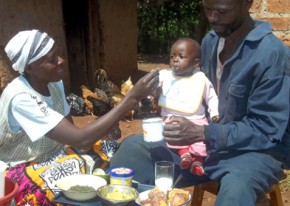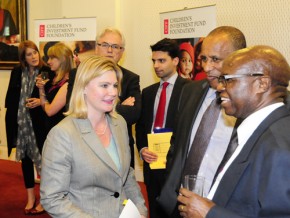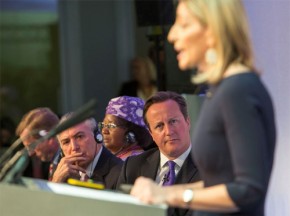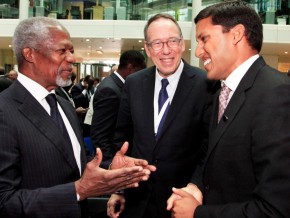We now know that undernutrition is the cause of nearly half of all child deaths – and we know what we can do about it.
Last week there was a series of high level nutrition events in London. I’m part of the Nutrition for Growth team delivering them. It began on Wednesday with the launch of the new Lancet medical journal series on nutrition at Imperial College, right in the heart of St Mary Hospital. I really wanted to hear the top line results. It made for sobering news.
Undernutrition is now deemed to be the cause of 45% of child deaths globally: 3.1 million children die of malnutrition every year, that's over 8000 every day and 5 children every minute. There are still 165 million stunted children in the world. That's children who have not reached the height they should, and whose physical and mental capacities will be forever impacted by their lack of the right nutrients at the right time.

We also heard that the specific interventions for improving nutrition such as vitamin A capsules, treatment of diarrhea, and management of severe malnutrition can only reduce stunting by one fifth. We need to move beyond the usual way of doing business and tackle the underlying causes - making sure cash transfer programmes, sanitation provision and even girls education deliver for nutrition.

Thursday evening saw an event for Parliamentarians, held at the Speaker's House with fantastic views of the Thames to welcome our guests.Then on Friday 'Nutrition for Growth' was launched co-hosts DFID, the government of Brazil and The Children's Investment Fund Foundation with a reception at the Royal Society.

Justine Greening, the Secretary of State, laid out DFID's ambitions for our 'Nutrition for Growth'. She said, "everybody wherever they are born should reach their full potential" and we need a new approach that moves way beyond aid to tackle the challenge. She highlighted that backing good country plans and enhanced domestic resources will deliver for nutrition, which has been the most neglected topic in international development.
Countries such as Brazil have eradicated undernutrition, so it is possible. We hope working together as co-hosts will galvanize governments, business and science to work together to eradicate undernutrition altogether.
Minister Andreucci Neto, from the Office of the Vice President, spoke passionately about how Brazil has lifted 22 million people out of poverty since 2011 and worked to give all its citizens an able chance. They want to share their knowledge with countries now needing the knowledge to do the same.
The Brazil success story is certainly striking, and the Lancet series showed us that: Brazil came top of a ranking of countries showing equity in stunting rates – the very richest and very poorest have almost equally low rates. Thi is testimony to their history of targeting poorer people with safety net programmes. Using only national figures can hide how much more likely you are to have your potential thwarted by malnutrition, if you are poorer.
Momentum was growing all week towards the main event on Saturday at which donors, heads of state, business and science came together to make commitments that could reduce stunting in 20 million children.

The event at Unilever House saw representatives of 52 countries come to hear how countries, businesses and civil society organisations will commit to reduce undernutrition globally – 24 governments and 28 business, civil society and science organisations endorsed the Nutrition for Growth compact, which committed them to taking real, measurable action. Many of them also made their own financial and policy commitments, including increasing national budget allocation for nutrition, diversifying the crops the produce or ensuring they have a healthy workforce.
It was an exciting day, and you can see the films of the sessions here.
Alongside the Heads of State, Bill Gates, Kofi Annan and Beninese singer Angelique Kidjo, one of the undoubted stars of the day was a humble root vegetable – the orange sweet potato. It is not a traditional staple in Africa but is increasingly being planted. Just half a cup a day can prevent blindness and even death in young children, as it contains vital Vitamin A micronutrients. Donors including the UK announced new commitments to invest in the crop. There was even a tasty orange sweet potato salad on offer for delegates to try.

Nutrition has suffered from not getting the attention it deserves because it is hard to bring these very disparate communities together. Health workers speak a different language from agricultural professionals, business people speak a very different language from civil society organizations. It is a complicated message around the need to work in different sectors to ensure children get the right nutrients, at the right time, without them being wasted. I was struck throughout the day about how the landscape for nutrition has now changed, but also how great it was to hear the speakers not simplify the challenge of under nutrition to one of hunger.There are times in life when you get the opportunity to make an 'elevator pitch' to someone – I got that chance, in a very real sense, when I found myself in a lift with Bill Gates. Luckily there was no need as he is already fully signed up to the importance of tackling undernutrition – as his commitment to invest over $850 million by 2020 shows.
Donors like Gates, Prime Ministers, Ministers of Agriculture and Health, businesses and NGOs across the political spectrum talked with real passion about women’s rights, sanitation, livelihoods and other previously unpopular topics. That felt like a real step change.

6 comments
Comment by Dr Dan Magnus posted on
Anne, this is a great blog post and reaches to the very core of perhaps the single most important global child health issue.
As a paediatrician with a special interest in global health, I am constantly reminded of how the health community focus, for very valid reasons, on acute severe malnutrition and the devastating impact this has on children's lives. However waiting in the wings, so to speak, is the issue of chronic undernutrition and what this means not just for health and increased susceptibility to infections etc - but importantly for children's cognitive and physical development, school attendance and school performance. This issue, especially for girls, may unlock the potential to improve health and consequently education thereby reducing intergenerational cycles of poverty.
Many programmes and much research has focussed on vertical programmes to improve health and nutrition in the school environment such as through deworming, vitamin A supplementation, school feeding, malaria prevention or water and sanitation. But what is required are scaleable, holistic and integrated 'horizontal' programmes to improve school health and nutrition and (here is the key) with formally measured outcomes. Then we can work with partners and governments towards rolling out an effective and reproducible school health and nutrition programme that supports children at this time critical moment in their lives. The WHO, World Bank and many others have advocated for this for many years but we are short on effective programmes that are happening now and demonstrating results. One such programme is HealthStart being piloted in western Kenya (http://www.kopafrica.org/userfiles/files/HealthStart%20Results%20-%20March%202013.pdf) and we hope to collaborate with DFID and the Kenyan governement on scaling this up. Many thanks again for your piece, Dan.
Comment by Anne Philpott posted on
Thanks Dan, I totally agree that we need more horizontal or nutrition ' sensitive' programmes in which existing education, sanitation, livelihoods, agriculture etc are re-orientated to deliver for nutrition outcomes. The recent lancet series has made that even more critical with only 21% of stunting tackled by direct interventions. The series also shows that community management of severe malnutrition has by far the biggest reduction in mortality...but if course it's because those children are so sick and so close to death they need that life saving treatment.
But we need to get to a place where no child ever needs to be saved from acute malnutrition.
DFID will work now to deliver our commitment to make a large number of our programmes nutrition sensitive as per our statement on June 8th and we need to learn more about how to do that well collectively.
We have also launched a nutrition embedded evaluation programme (NEEP) that will allow us and NGOS to undertake robust evaluations - especially of these type of evaluations. You might want to apply?
We do need more global knowledge on what works to tackle the underlying causes of under nutrition, as you say.
Thanks again.
Comment by planB4fashion - John Robertson posted on
You can read about food poverty in the UK on a page of this newspaper web site:
http://www.guardian.co.uk/society/food-poverty
I blame this problem, in small part on the UK's Department for International Development but that's a long story; the basic problem is that the manufacturing economy and excahnge rates have been governed by rather pompous people with unlucky results, and that they have also let the national insurance or welfare state system get more and more run-down as money runs short. They still have money for Opera and and a large military, but this is really diverted money that most people would rather were spent on the welfare state. It's a story that sounds like any third-world country in need of Dfid aid, but the country is the United Kingdom of Great Britain and Northern Ireland.
In one small way this is the Department for International Development's problem. It is strange that well-paid UK citizens who have benefited from a welfare state tend to loose all enthusiasm for it in the lost property office at Heathrow when they go to advise other countries; a system like national insurance for Tanzania would help parents live with fewer children, help more children stay longer at school, and so increase wealth. It could also pay some of the bills of people who are young, old, sick, or unemployed. That would be a good system for Tanzania and Dfid (or rather the European Commission but perhaps on their advice) should withdraw cheap low-tariff access to European Union markets until such a system is introduced.
I am based in the UK and said that UK poverty is partly a Department for International Development problem. That is because, in avoiding any mention of a welfare state in third world countries, they promote unfair competition to the shabby and run-down welfare states of european countries. And they do this quite deliberately through a network of organisations designed to change public opinion.
I've just reported on a training and networking conference called Ethical Fashion Source Summit run by a group which has had Dfid grants in the past, I think. It invited a guest speaker http://www.sustainable-fashion.com/ who has been paid by Department for International Development to help fashion colleges train buyers in a set of ethics that do not include any mention of the welfare state. A strange thing about the conference was that a speaker rattled-through early responses to their "Call to Action" poll of what to do about trade with Bangladesh. A majority of the main responses were about European governments forcing the Government of Bangladesh to take action. But the conference itself hardly mentioned government or even its own funding at all. I've just checked the list of funders on...
http://www.sustainable-fashion.com/about-csf/our-funders-partners/
...and it proves me wrong; Dfid have no current direct funding (it was the Development Awareness Fund, now closed) but, more generally, UK and European government promote a trade system in which national insurance is invisible and difficult for poorer countries to implement without risking loosing their share of trade.
I'm sorry for such a rambling response of the top of my head, and thanks to anyone who has read down this far!
John Robertson
https://facebook.com/planB4fashion
Comment by anne posted on
Many thanks to all of you who have taken time to read the blog and comment.
With 3.1 million children dying unnessacrily of under nutrition every year, it is great to see such interest in the previously over looked topic of undernutrition.
For those who want more info on DFID's hunger and nutrition policies see here: https://www.gov.uk/government/policies/reducing-hunger-and-malnutrition-in-developing-countries and watch this space for more personal reflections from me on the issues.
Comment by Khurshid Talukder posted on
I'm sorry I 'm writing to you on your blog. But I didn't have your email address. I'm a paediatrician from Bangladesh, currently attending the scale up of CMAM in SE Asia meeting in Bangkok. I was listening to your Q+A session (on Youtube) at the London conference in October and you kept saying "resistance to CMAM" in India and Bangladesh. Are you sure people who are resisting your efforts are resisting CMAM? I think you're labelling people who resist RUTF (from Nutriset OR locally made) "resistant to CMAM". I'm totally opposed to all forms of RUTF but am totally for CMAM with home cooked energy dense food. In Bangladesh the BPA is of the same view, so unless people start investing in further research on and scaling of home cooked energy dense food there's not going to be any progress on CMAM.
Comment by Anne posted on
Thanks Kurshid, and thanks for listening to the Q and A at the ACF conference. I'm sorry that it sounded like I was saying India and Bangladesh as a whole are not welcoming to CMAM. My experience when working in India however was that there was quite a bit of dialogue and some confusion about CMAM - as a new concept. And I agree that there is opposition to certain types of non locally produced RUTF - and that is different to opposition to CMAM. Although connected !
I agree we need some research that compares home cooked energy dense with RUTF - although I understand that research elsewhere has shown it is hard to get the same recovery rates. I understand that Valid is supporting some initial trials.
Thanks for the comment, Anne